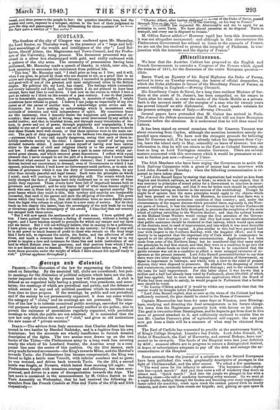ffortign anti Colonial.
FitaNCE.—The discussion of the law for suppressing the Clubs termi- nated on Saturday. By the amended bill, clubs are interdicted; but pub- lie meetings for the discussion of political subjects which have not the cha- racter imputed to clubs by the present law will be permitted. A club is defined as an organized body having a president, Tice-presidents, and secre- taries; the meetings of which are periodical and public, and the debates of which extend to any and all political questions which its members may from time to time propose. If the meetings be public and not periodical, and if the society be not permanently organized, it does not come within the category of " clubs," and its meetings are not prevented. The inten- tion of the law is to tolerate occasional public meetings, convoked for espe- cial purposes duly announced, and previously notified to the police; also to permit the existence of associations regularly organized, with periodical meetings to which the public are not admitted. It is contended that the new law only abolishes the name of " club," and gives to old institutions the new name of " private societies."
Harar.—The advices from Italy announce that Charles Albert has been routed in two battles by Marshal Radetsky, and is a fugitive from his own dominions; but the accounts are wholly insufficient to furnish detailed description of the fights. The two armies were drawn up on the two banks of the Ticino—the Piedmontese army in a long weak line covering nearly the whole of his Lombard frontier, the Austrian army in a com- Pacter line near the centre of this position. On the 21st instant, each army made forward movements—the King's towards Milan, and the Marshal's towards Turin: the Piedmontese line became compromised; the King was forced to fight a battle near Vercelli, with inferior numbers and no guns; he was worsted, and driven back towards Turin. On the 23d, a second battle was fought, at Novarre, which lasted from morning till night: the Piedmontese fought with tenacious courage and efficiency, but were over- Powered, and driven in a state of disorganization towards the Alps. The last news is contained in the announcement by M. Odilon Barret to the Paris Assembly on Wednesday, that he had received the following de- spatches from the French Consuls at Nice and Turin of the 27th and 25th respectively-
; .a.mur of the Duke of Savoy, passed "Charles Albert, after having abelicat
. ee in tne morn ng, s y . morning. on his way to FranCe "
through Nice on the emt. „ _ ass requested Mr. Abercrombe and me to apply for an armistice to cover Turin. We have placed ourselves at its disposal. Turin is tranquil, and every one is disposed to remain."
M. Odilon Barrot added—" However rapid has been this denouement, it was not altogether unexpected: and although in this circumstance the Piedmontese Government has refused to listen to the counsels of France, we are not the less resolved to protect the integrity of Piedmont, in con- junction with the interests and the dignity of France."


























 Previous page
Previous page